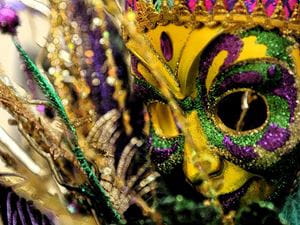
What do you think of when you think of Mardi Gras? Colorful costumes, spectacular parades, elegant pageants and masquerade balls are what might come to mind. People dancing in the streets of New Orleans going wild are all a part of this joyful celebration. However, it is very much known as a party holiday filled with liquor, gluttony and sin. It promotes those who observe it to let go of their inhibitions and enjoy these fleshly desires. So is it something that Christians should celebrate?
History of Mardi Gras
Mardi Gras, also known as Carnival in many countries, is a time of unrestrained fun, in which observers indulge in many desires. Mardi Gras was celebrated in Roman Catholic communities in Europe and Latin America before it grew in America. Though the term refers to one specific day, Mardi Gras is not a single-day celebration. Starting in January, festivities occur daily. It goes until the final Mari Gras celebration the day before Lend, the 40-day period between Ash Wednesday and Easter Sunday. Mardi Gras is considered to be the last day for indulging in the pleasures of the flesh before Lent begins. In fact, the word Carnival means “farewell to the flesh,” and comes from the Latin words carnis (“flesh”) and vale (“farewell”).
Surprisingly, Mardi Gras long predates Christianity. The earlier record of the even comes from ancient times when tribes celebrated a fertility festival that welcomed the arrival of spring and a a time of renewal of life. The Romans called this pagan festival Lupercalia in honor of “Lupercus,” the Roman god of fertility. Lupercalia was a party full of merrymaking held each February in Rome, after which participants fasted for 40 days. Similar to modern celebrations, the Romans wore masks, dressed in costumes and indulged in fleshly desires.
As pagans converted to Catholicism, they did not want to give up this popular celebration. Church leaders quickly realized that they couldn’t pull their new members away from the holiday, so instead decided to “Christianize” the festival. Carnival was created as a time of celebration immediately preceding their pagan 40-day fast, which the church named “Lent.” From there, Mardi Gras developed into the elaborate affair it is today during the 19th and 20th centuries.
What Scriptures Says
The real question is what does God have to say about such matters, or does He care if Christians celebrate? Scripture tells us specifically what isn’t ok about these holidays. The Bible says in Deuteronomy 12:29-31 and 18:9-14 not to adopt practices steeped in paganism. Though the holiday was “Christianized” it is still rooted in ancient pagan practices. Any festival or religious observes of pagan origins is unacceptable to Jesus Christ (1 Corinthians 10:1-4).
In addition, the holiday originally celebrated pagan gods. Many of the parades celebrate and honor false gods such as Bacchus and Venus. John 4:1 states “Beloved, do not believe every spirit, but test the spirits to see whether they are from God, for many false prophets have gone out into the world.” Furthermore, in discussing false worship the Bible calls the sight of a women weeping for Tammuz (god of food and vegetation) an abomination, and reveals god’s anger about the celebrations for him (Ezekiel 8:13-18). Acknowledging these false gods in the celebrations, even if you don’t feel like you are specifically praising them, goes directly against what God asks of His children.
God wants us to hate sin, put it away and truly repent. Mardi Gras promotes an enjoy-sin-now, repent-later attitude that is the opposite of true repentance. It is hypocritical for anyone who claims to seek or serve the true God to participate in a festival that originates from paganism and promotes immoral behavior. God wants us to constantly be trying to live our lives in His image, which means avoiding sin at all costs. Mardi Gras cannot be considered harmless fun, when we are actively sinning. God does not allow us to throw away our restraints and indulge in these “works of flesh” that include drunkenness, public nudity, illicit sex, brawling and revelry (Galatians 5:19-21). Because it’s a holiday does not excuse it from God’s rules.
God wants Christians to worship Him. He wants us to celebrate, but He wants us to do it correctly—the way He has instructed us to. We are to be joyous and festive on religious days, but we are to do it on days He has designated. God did not create Mardi Gras for Christians, and with so many sinful ties to the holiday it is highly advised we don’t endorse it. Not only should Christians not participate in evil, God commands them to avoid even the appearance of evil (1 Thessalonians 5:22).

